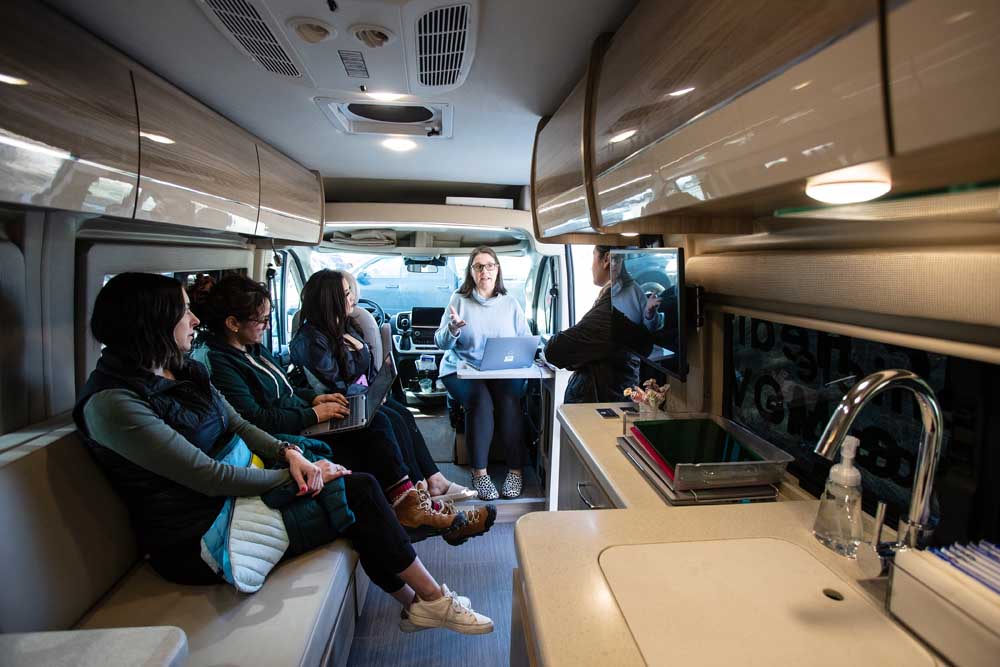Deschutes County Health Services partners with colleges to offer reproductive health options
Published 5:30 am Thursday, March 14, 2024

- Anne Kilty, center, a nurse practitioner and Deschutes County Health Services clinical family services program manager, talks to other staff members after offering services to students in the Deschutes County Health Services’ mobile clinic on March 7 at Oregon State University-Cascades. The mobile clinic, which operates out of a van, provides free or low-cost sexual and reproductive health services.
Deschutes County Health Services launched a mobile health clinic focusing on sexual and reproductive health for local college students this month, an initiative that has been in the works since before the pandemic.
Young adults are at higher risk for unintended pregnancies or sexually transmitted diseases, making it important that college students receive help when they need it.
The mobile clinic — a van that will regularly visit Central Oregon Community College and Oregon State University-Cascades — will provide prescription medications, well-woman services and check-ins with a health provider.
“The needs of students on campuses without student health centers certainly have not gone away,” said Anne Kilty, clinical and family services manager for Deschutes County Health Services. “Their access to services can be limited. Often they don’t know where to go for services, and it’s hard for them to navigate the system, just ‘cause they tend to be younger and have less experience.”
Before the pandemic, it was tricky to figure out how to bring services to students.
Students did not need these services on a daily basis, and it was difficult to come up with a confidential space to host health services on campuses. During the pandemic, Kilty applied for and received a grant from the Central Oregon Health Council that allowed county health officials to purchase a van to host a mobile clinic. This meant the county could offer services to COCC and OSU-Cascades students.
Though the clinic just launched at OSU-Cascades, Kilty said it’s going well. The clinic can provide most reproductive services and services related to sexually transmitted infections, except for intrauterine devices and pelvic exams due to the lack of an exam table.
Kilty said the clinic can also dispense prescription medication to patients at the time of their visit, which increases the likelihood that they will continue with the medication.
Kilty hopes to eventually offer immunizations in the van, as well as vaccinations and walk-up blood pressure and diabetes checks.
“We are public health: we’re there to help the public in the ways that we can,” she said. “It’s the goal in my conversations with OSU and COCC for their students to have ready access to some services to help them stay healthy and have some preventative care in the realm that we can offer it.”
Kilty said Deschutes County Health Services wants to help fill in the gaps for small colleges that may not be able to support a full health services clinic.
If more assistance is necessary, county health officials will arrange for students to be seen at a clinic building or with another provider.
Partnership with COCC
Lindsay Buccafurni, the assistant director of student life at COCC, is excited to bring direct health services to students, since the college doesn’t have a health clinic on campus.
“We know that getting off campus can be a barrier for some students, so we’re just hoping we can provide better access,” she said. “(Being able to) provide more support directly on campus for our students is really what we’re looking for.”
The clinic will start visiting the COCC campus on April 11, and will be stationed in front of Coats Campus Center. It will be at COCC on the second and fourth Thursdays of the month.
OSU-Cascades works to expand health services
OSU-Cascades campus administrators see the mobile clinic as a way to expand their health-service options for students as the campus continues to raise funds for a health and recreation center. The mobile clinic will visit the campus on the first and third Thursdays of each month. It began March 7.
Natalie Bowker, director of student health and wellness at OSU-Cascades, said it feels great to provide the mobile health clinic service to students.
“We’re really proud of being their first school — place, really — that they’ve been able to access and get on board, and we really hope students take advantage of the services there because we know they want them,” Bowker said.
Brooke Martindale, student wellness coordinator at OSU-Cascades, focuses on education and advocacy work to guide students to the health and counseling services they need, including the new mobile clinic.
“It’s a great way for students to access services if they don’t have transportation or limited time,” said Martindale.
Martindale wants students to know that these services are available, and that they know they can ask for help.
“Advocating for yourself is a skill that you can use for the rest of your life and will really impact your health long-term,” said Martindale.
OSU-Cascades is part of OSU’s main health system, which includes a nurse advice line and online support groups for students.
The campus recently hired a part-time nurse to assist students, expanding the health services the university can offer despite its current lack of a building dedicated to health services. The nurse will work closely with OSU’s main campus, disability access services and community resources.
OSU-Cascades’ health services will next move into the student success center, which is set to open in the 2024-25 school year.
COCC Foundation’s Meal of the Year is April 13






